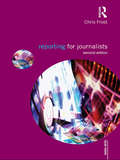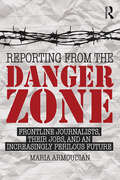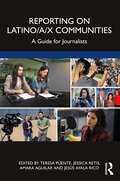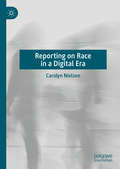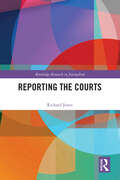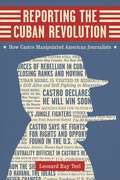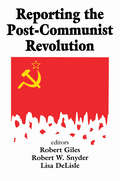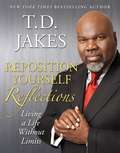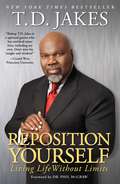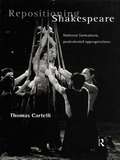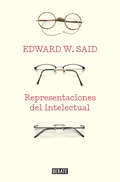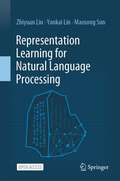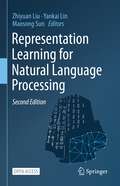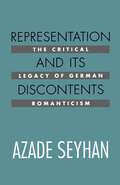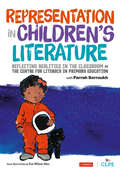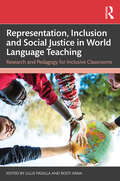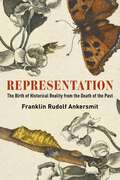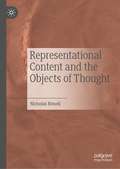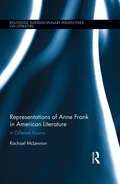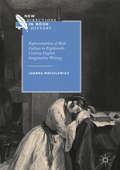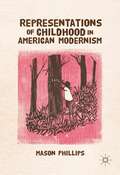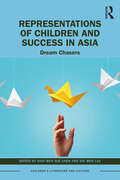- Table View
- List View
Reporting for Journalists
by Chris FrostReporting for Journalists explains the key skills needed by the twenty-first century news reporter. From the process of finding a story and tracing sources, to interviewing contacts, gathering information and filing the finished report, it is an essential handbook for students of journalism and a useful guide for working professionals. Reporting for Journalists explores the role of the reporter in the world of modern journalism and emphasises the importance of learning to report across all media – radio, television, online, newspapers and periodicals. Using case studies, and examples of print, online and broadcast news stories, the second edition of Reporting for Journalists includes: information on using wikis, blogs, social networks and online maps finding a story and how to develop ideas researching the story and building the contacts book including crowd sourcing and using chat rooms interactivity with readers and viewers and user generated content making best use of computer aided reporting (CAR), news groups and search engines covering courts, councils and press conferences reporting using video, audio and text preparing reports for broadcasting or publication consideration of ethical practice, and cultural expectations and problems an annotated guide to further reading, a glossary of key terms and a list of journalism websites and organisations.
Reporting from the Danger Zone: Frontline Journalists, Their Jobs, and an Increasingly Perilous Future
by Maria ArmoudianJournalism is a dangerous business when one’s "beat" is a war zone. Armoudian reveals the complications facing frontline journalists who cover warzones, hot spots and other hazardous situations. It compares yesterday’s conflict journalism, which was fraught with its own dangers, with today’s even more perilous situations—in the face of shrinking journalism budgets, greater reliance on freelancers, tracking technologies, and increasingly hostile adversaries. It also contrasts the difficulties of foreign correspondents who navigate alien sources, languages and land, with domestically-situated correspondents who witness their own homelands being torn apart.
Reporting on Latino/a/x Communities: A Guide for Journalists
by Teresa PuenteThis book offers a critical and practical guide for journalists reporting on issues affecting the Latinx community. Reporting on Latino/a/x Communities emphasizes skills and best practices for covering topics such as economics, immigration and gender. The authors share honest stories about challenges Latino/a/x journalists face in newsrooms, including imposter syndrome and lack of representation in news, along with strategies to face and tackle systematic barriers. Stories from leaders in the media industry are also featured, including journalists and media professionals from ABC News, Los Angeles Times, Alt.Latino at NPR, and mitú. Additionally highlighted are experimental and non-traditional new initiatives and outlets leading the future of news media for Latino/a/x audiences. This book is an invaluable guide for any student or journalist interested or involved in the news media and questions of Latino/a/x representation.
Reporting on Race in a Digital Era
by Carolyn NielsenThis book explores U.S. news media’s 21st century reckoning with race, from the election of President Barack Obama, through the birth and growth of the Black Lives Matter movement, to the tense weeks after a white police officer killed an unarmed African American teenager in Ferguson, Missouri. While legacy newsrooms struggled to interpret complex events, a diverse group of digital storytellers used emerging technologies. Veteran journalist and media scholar Carolyn Nielsen examines how the first two decades of this century produced new models for journalists to explore the complexity of racism, amplify the voices of lived experience, and understand their audiences. Using critical analysis of news coverage and interviews with reporters who cover racial issues, the book shows how new models of journalism break with legacy journalism’s conceptions of objectivity, expertise, and news judgment to provide deeper understanding of systems of power.
Reporting the Courts (Routledge Research in Journalism)
by Richard JonesThis book makes a critical intervention into debates about journalism and the crisis in local news. Interrogating the history and current practice of court coverage in the UK, the author argues for its importance as a central feature of both open justice and public interest reporting.The book challenges narratives of a decline in the perceived quality of local media. Yet it also highlights a reliance on major local press companies facing acute financial challenges, meaning court reporting faces a potentially precarious future. The book critically examines coverage of the courts in the context of financial crises, which have diminished both newspapers and the criminal justice system. How the norms of court journalism emerged and evolved are put under scrutiny, and the book then considers how court reporting is practiced today, including the use of cameras and social media as well as remote hearings during and since the pandemic. The author takes us inside a major murder trial and explores why court reporting remains worth preserving and enhancing.Offering recommendations which could help to maintain and extend coverage of the courts, this volume will interest students and scholars of journalism, mass communication, media studies, media law and communication studies.
Reporting the Cuban Revolution: How Castro Manipulated American Journalists (Media and Public Affairs)
by Leonard Ray TeelReporting the Cuban Revolution reveals the untold story of thirteen American journalists in Cuba whose stories about Fidel Castro's revolution changed the way Americans viewed the conflict and altered U.S. foreign policy in Castro's favor. Between 1956 and 1959, the thirteen correspondents worked underground in Cuba, evading the repressive censorship of Fulgencio Batista's dictatorship in order to report on the rebellion led by Fidel Castro. The journalists' stories appeared in major newspapers, magazines, and national television and radio, influencing Congress to abruptly cut off shipments of arms to Batista in 1958. Castro was so appreciative of the journalists' efforts to publicize his rebellion that on his first visit to the United States as premier of Cuba, he invited the reporters to a private reception at the Cuban Embassy in Washington, where he presented them with engraved gold medals. While the medals revealed Castro's perception of the correspondents as like-minded partisans, the journalists themselves had no such intentions. Some had journeyed to Cuba in pursuit of scoops that could rejuvenate or jump-start their careers; others sought to promote press freedom in Latin America; still others were simply carrying out assignments from their editors. Bringing to light the disparate motives and experiences of the thirteen journalists who reported on this crucial period in Cuba's history, Reporting the Cuban Revolution is both a masterwork of narrative nonfiction and a deft analysis of the tension between propaganda and objectivity in the work of American foreign correspondents.
Reporting the Post-communist Revolution
by Robert SnyderThe events of 1989 were the material of great reporting. They also revealed the power of journalism. Long before people in Central and Eastern Europe liberated themselves, they discovered democratic freedom, putting to print their own ideas and chronicling events of the day. Indeed, long before they had democracies in law, they had imagined them on paper.In the Solidarity network that produced books and leaflets and news bulletins, in the essays of Václav Havel, in the samizdat publishing house in Budapest that used a portable printing machine, Eastern Europeans demonstrated the organic link between journalism and self-government. They showed how journalism nurtures the imagination, dialogue, and honesty that are basic to democratic life.If history had ended in 1989, there would be cause for easy optimism. The changes that swept Central and Eastern Europe passed with relatively little bloodshed. But agonies of the former Yugoslavia, convulsions of the former Soviet Union, and enduring battles with censors and would-be censors bedevil emerging democracies. Not only does much remain for journalists to cover in Central and Eastern Europe, in some places there the fate of journalism is still an open question. For all these reasons, Reporting the Fall of European Communism explores, not only the events of 1989, but new stories that have emerged in Central and Eastern Europe over the past decade. This volume will be of interest to media professionals, academics and others with an interest in the power of journalism.
Reposition Yourself Reflections
by T. D. JakesT.D. Jakes offers readers of the New York Times bestseller Reposition Yourself: Living Life Without Limits a collection of scripture and quotes that provides the spiritual underpinnings of his message about applying Christian principles to adjust to the many changes that life brings. Reposition Yourself, the narrative book, uses wisdom collected from more than thirty years of Jakes's experience counseling and working with high-profile and everyday people on financial, relational, and spiritual creativity on the path to an enriched life filled with contentment at every stage. Reposition Yourself Reflections collects the words that ground Reposition Yourself solidly in biblical teachings. Reflections is an essential keepsake, to carry with you in moments when inspiration and encouragement are needed.
Reposition Yourself: Living Life Without Limits
by T.D. JakesLife should be full of success, spirituality, and happy relationships, but we often settle for less—Reposition Yourself is a guide for living a more prosperous life through Christian principles.The star of BET&’s Mind, Body & Soul, and featured guest speaker on Oprah&’s Lifeclass, Potters House pastor T.D. Jakes offers readers the New York Times bestselling Reposition Yourself: Living Life Without Limits, an inspirational narrative self-help book that provides the spiritual underpinnings of his message about applying Christian principles to adjust to the many changes that life brings. In the vein of Joel Osteen&’s Become a Better You and Dr. Phil&’s Life Strategies, Reposition Yourself uses wisdom collected from more than thirty years of Jakes&’s experience counseling and working with high-profile and everyday people on financial, relational, and spiritual creativity on the path to an enriched life filled with contentment at every stage.
Repositioning Shakespeare: National Formations, Postcolonial Appropriations (Routledge Research In Shakespeare And Renaissance Studies #Vol. 2)
by Thomas CartelliRepositioning Shakespeare offers an original assessment of a broad range of texts and cultural events that appropriate Shakespeare. Examining these materials within the context of 'the nation' in a postcolonial era, Thomas Cartelli considers: * essays by Walt Whitman * the nineteenth-century play, 'Jack Cade' * novels by Aphra Behn, Ngugi Wa Thiong'o, Michelle Cliff, Tayeb Salih, Nadine Gordimer and Robert Stone * the 1849 Astor Place Riot Cartelli places particular emphasis on redefining the 'postcolonial' in order to find a place for America. In doing so, Repositioning Shakespeare makes a considerable contribution to the continuing debate about the uses we make of Shakespeare.
Represent and Destroy: Rationalizing Violence in the New Racial Capitalism (Difference Incorporated)
by Jodi MelamedIn the global convulsions in the aftermath of World War II, one dominant world racial order broke apart and a new one emerged. This is the story Jodi Melamed tells in Represent and Destroy, portraying the postwar racial break as a transition from white supremacist modernity to a formally antiracist liberal capitalist modernity in which racial violence works normatively by policing representations of difference. Following the institutionalization of literature as a privileged domain for Americans to get to know difference—to describe, teach, and situate themselves with respect to race—Melamed focuses on literary studies as a cultural technology for transmitting liberal racial orders. She examines official antiracism in the United States and finds that these were key to ratifying the country&’s global ascendancy. She shows how racial liberalism, liberal multiculturalism, and neoliberal multiculturalism made racism appear to be disappearing, even as they incorporated the assumptions of global capitalism into accepted notions of racial equality. Yet Represent and Destroy also recovers an anticapitalist &“race radical&” tradition that provides a materialist opposition to official antiracisms in the postwar United States—a literature that sounds out the violence of liberal racial orders, relinks racial inequality to material conditions, and compels desire for something better than U.S. multiculturalism.
Representaciones del intelectual: Ensayos sobre literatura clásica (Paidos Studio Ser.)
by Edward W. SaidSaid analiza la importancia de la visión ética y la lucha contra la arbitrariedad del poder por parte de los intelectuales. Pocos autores han alcanzado la talla moral e intelectual del profesor Said, cuya figura crece con el paso del tiempo. Respetado incluso por sus detractores, en este libro (seis magistrales conferencias del ciclo Reith, que inició, en 1948, Bertrand Russell) se analiza la importancia de la visión ética y la lucha contra la arbitrariedad del poder por parte de los intelectuales en nuestro tiempo. Said parte de la idea clásica del intelectual como francotirador, perturbador del status quo, un desmitificador obligado a la soledad del juicio ante el empuje de los medios de comunicación que moldean la opinión pública mundial. El intelectual, sostiene el profesor Said, deberá ser el encargado de descubrir esta manipulación. Encuadrados dentro de la sociedad de consumo, los intelectuales son vulnerables a la presión del poder y caen, en numerosas ocasiones, en la banalidad y la falta de sentido crítico. Frente a la cómoda complicidad, la principal misión del intelectual consistirá, a ojos de Edward W. Said -un pensador comprometido con su tiempo-, en defender la independencia de criterio. Esta posición, cuando es real, les llevará a vivir como marginados o, en el peor de los casos -la propia vivencia de Said-, como exiliados.
Representation Learning for Natural Language Processing
by Maosong Sun Zhiyuan Liu Yankai LinThis open access book provides an overview of the recent advances in representation learning theory, algorithms and applications for natural language processing (NLP). It is divided into three parts. Part I presents the representation learning techniques for multiple language entries, including words, phrases, sentences and documents. Part II then introduces the representation techniques for those objects that are closely related to NLP, including entity-based world knowledge, sememe-based linguistic knowledge, networks, and cross-modal entries. Lastly, Part III provides open resource tools for representation learning techniques, and discusses the remaining challenges and future research directions. The theories and algorithms of representation learning presented can also benefit other related domains such as machine learning, social network analysis, semantic Web, information retrieval, data mining and computational biology. This book is intended for advanced undergraduate and graduate students, post-doctoral fellows, researchers, lecturers, and industrial engineers, as well as anyone interested in representation learning and natural language processing.
Representation Learning for Natural Language Processing
by Maosong Sun Zhiyuan Liu Yankai LinThis book provides an overview of the recent advances in representation learning theory, algorithms, and applications for natural language processing (NLP), ranging from word embeddings to pre-trained language models. It is divided into four parts. Part I presents the representation learning techniques for multiple language entries, including words, sentences and documents, as well as pre-training techniques. Part II then introduces the related representation techniques to NLP, including graphs, cross-modal entries, and robustness. Part III then introduces the representation techniques for the knowledge that are closely related to NLP, including entity-based world knowledge, sememe-based linguistic knowledge, legal domain knowledge and biomedical domain knowledge. Lastly, Part IV discusses the remaining challenges and future research directions.The theories and algorithms of representation learning presented can also benefit other related domains such as machine learning, social network analysis, semantic Web, information retrieval, data mining and computational biology. This book is intended for advanced undergraduate and graduate students, post-doctoral fellows, researchers, lecturers, and industrial engineers, as well as anyone interested in representation learning and natural language processing.As compared to the first edition, the second edition (1) provides a more detailed introduction to representation learning in Chapter 1; (2) adds four new chapters to introduce pre-trained language models, robust representation learning, legal knowledge representation learning and biomedical knowledge representation learning; (3) updates recent advances in representation learning in all chapters; and (4) corrects some errors in the first edition. The new contents will be approximately 50%+ compared to the first edition. This is an open access book.
Representation and Its Discontents: The Critical Legacy of German Romanticism
by Azade SeyhanAzade Seyhan provides a concise, elegantly argued introduction to the critical theory of German Romanticism and demonstrates how its approach to the metaphorical and linguistic nature of knowledge is very much alive in contemporary philosophy and literary theory. Her analysis of key thinkers such as Friedrich Schlegel and Novalis explores their views on rhetoric, systematicity, hermeneutics, and cultural interpretation. Seyhan examines German Romanticism as a critical intervention in the debates on representation, which developed in response to the philosophical revolution of German Idealism.Facing a chaotic political and intellectual landscape, the eighteenth-century theorists sought new models of understanding and new objectives for criticism and philosophy. Representation and Its Discontents identifies the legacy of this formative moment in modern criticism and suggests its relevance to contemporary discussions of post-structuralism, orientalism, theories of textuality, and the nature of philosophical discourse.
Representation in Children′s Literature: Reflecting Realities in the classroom
by CLPEThe under-representation of characters of colour in children′s literature in the UK is quantified in the CLPE′s award winning Reflecting Realities research.Through this research, the CLPE actively disrupts the demand-and-supply chain and holds the children′s publishing industry to account, encouraging it to do better. This book: * explores what Reflecting Realities teaches us; * empowers teachers to take positive to ensure classroom libraries are truly representative; * takes time to reflect on the research; * enables teachers to explore what constitutes quality representation; * includes practical support on how to translate this thinking into positive change in the classroom; * provides guidance for curating literature for young readers; * highlights how engagement with inclusive literature positively impacts school reading cultures and wider teaching and learning.
Representation in Children′s Literature: Reflecting Realities in the classroom
by CLPEThe under-representation of characters of colour in children′s literature in the UK is quantified in the CLPE′s award winning Reflecting Realities research.Through this research, the CLPE actively disrupts the demand-and-supply chain and holds the children′s publishing industry to account, encouraging it to do better. This book: * explores what Reflecting Realities teaches us; * empowers teachers to take positive to ensure classroom libraries are truly representative; * takes time to reflect on the research; * enables teachers to explore what constitutes quality representation; * includes practical support on how to translate this thinking into positive change in the classroom; * provides guidance for curating literature for young readers; * highlights how engagement with inclusive literature positively impacts school reading cultures and wider teaching and learning.
Representation, Inclusion and Social Justice in World Language Teaching: Research and Pedagogy for Inclusive Classrooms
by Lillie Padilla Rosti VanaThis volume introduces teaching methodologies for improving and incorporating representation, inclusion and social justice perspectives in the world language curriculum. Chapters present state-of-the-art research and cover many different language contexts, including French, Spanish, Mandarin, and Portuguese. Authors discuss difficult and hot topics, such as Critical Language Awareness, Critical Race Theory, non-binary language use in gendered languages, culturally sustaining curriculum, teaching heritage language speakers, and more. Ideal for graduate courses, students, and scholars in world language education, the volume offers new pathways and strategies for promoting diversity and equity in the classroom.
Representation: The Birth of Historical Reality from the Death of the Past (Columbia Themes in Philosophy)
by Franklin Rudolf AnkersmitWhat makes historical writing distinctive? In Representation, Franklin Rudolf Ankersmit—the preeminent figure in the philosophy of history today—offers a deeply original way of understanding the practice of historical writing and a powerful vindication of history as an empirical discipline. Based on a new reading of the philosophy of G. W. Leibniz, Ankersmit constructs a rigorous framework for understanding the nature of historical argument.Representation argues that while previous states of affairs have left evidence that can be used to formulate true statements, the past itself is irretrievably lost. A condition of historical writing is that the past as such does not exist. Historical texts are best understood as complex signs that mutually criticize one another to compose a historical reality fundamentally distinct from common-sense notions of the past.Representation casts an entirely new light on fundamental concepts such as historical truth, historical debate, and historical rationality. Cogent, forceful, and provocative, this book is the most ambitious work in the philosophy of history in many years.
Representational Content and the Objects of Thought
by Nicholas RimellThis book defends a novel view of mental representation—of how, as thinkers, we represent the world as being. The book serves as a response to two problems in the philosophy of mind. One is the problem of first-personal, or egocentric, belief: how can we have truly first personal beliefs—beliefs in which we think about ourselves as ourselves—given that beliefs are supposed to be attitudes towards propositions and that propositions are supposed to have their truth values independent of a perspective? The other problem is how we can think about nonexistents (e.g., Santa Claus) given the widespread view that thought essentially involves a relation between a thinker and whatever is being thought about. The standard responses to this puzzle are either to deny that thought is essentially relational or to insist that it is possible to stand in relations to nonexistents. This book offers an error theory to the problem. The responses from this book arise from the same commitment: a commitment to treating talk of propositions—as the things towards which our beliefs are attitudes—as talk of entities that actually exist and that play a constitutive and explanatory role in the activity of thought.
Representations of Anne Frank in American Literature: Stories in New Ways (Routledge Interdisciplinary Perspectives on Literature)
by Rachael McLennanThis book explores portrayals of Anne Frank in American literature, where she is often invoked, if problematically, as a means of encouraging readers to think widely about persecution, genocide, and victimisation; often in relation to gender, ethnicity, and race. It shows how literary representations of Anne Frank in America over the past 50 years reflect the continued dominance of the American dramatic adaptations of Frank’s Diary in the 1950s, and argues that authors feel compelled to engage with the problematic elements of these adaptations and their iconic power. At the same time, though, literary representations of Frank are associated with the adaptations; critics often assume that these texts unquestioningly perpetuate the problems with the adaptations. This is not true. This book examines how American authors represent Frank in order to negotiate difficult questions relating to representation of the Holocaust in America, and in order to consider gender, coming of age, and forms of inequality in American culture in various historical moments; and of course, to consider the ways Frank herself is represented in America. This book argues that the most compelling representations of Frank in American literature are alert to their own limitations, and may caution against making Frank a universal symbol of goodness or setting up too easy identifications with her. It will be of great interest to researchers and students of Frank, the Holocaust in American fiction and culture, gender studies, life writing, young adult fiction, and ethics.
Representations of Book Culture in Eighteenth-Century English Imaginative Writing (New Directions in Book History)
by Joanna MaciulewiczThis book is a contribution to the new field of literary studies which is informed by book history and takes interest in the intersection of the ideal and material aspects of literature. It studies the ways eighteenth-century English novels, plays and poems illustrated the changes which the growth of literacy, the proliferation of writing and the emergence of print marketplace made in the social and cultural life of Britain and demonstrated the contingency of the emerging criticism on the technological and economic conditions of book production. The first part focusses on the representation of the tensions created by the emergence of literate society and on the hopes and fears awoken by the expansion of the cultural public sphere caused by the proliferation of print. The second part explores the contribution of literature to the shaping of the roles of authors, readers and patrons in the field of literary production.
Representations of Childhood in American Modernism
by Mason PhillipsThis book documents American modernism’s efforts to disenchant adult and child readers alike of the essentialist view of childhood as redemptive, originary, and universal. For James, Barnes, Du Bois, and Stein, the twentieth century’s move to position the child at the center of the self and society raised concerns about the shrinking value of maturity and prompted a critical response that imagined childhood and children’s narratives in ways virtually antagonistic to both. In this original study, Mason Phillips argues that American modernism’s widespread critique of childhood led to some of the period’s most meaningful and most misunderstood experiments with interiority, narration, and children’s literature.
Representations of Childhood in American Modernism
by Michelle H. PhillipsThis book documents American modernism's efforts to disenchant adult and child readers alike of the essentialist view of childhood as redemptive, originary, and universal. For James, Barnes, Du Bois, and Stein, the twentieth century's move to position the child at the center of the self and society raised concerns about the shrinking value of maturity and prompted a critical response that imagined childhood and children's narratives in ways virtually antagonistic to both. In this original study, Michelle H. Phillips argues that American modernism's widespread critique of childhood led to some of the period's most meaningful and most misunderstood experiments with interiority, narration, and children's literature.
Representations of Children and Success in Asia: Dream Chasers (Children's Literature and Culture)
by Sue Chen, Shih-Wen and Wen Lau, SinThis edited volume explores how success is conceptualized and represented in texts for young people in Asia. The essays in this collection examine how success for children relates to education, family, gender, race, class, community, and the nation. It answers the following questions: How is success for children represented in literature, cinema, and popular media? In what ways are these images grounded in the historical, political, and cultural contexts in which they are produced and consumed? How does childhood agency influence ideas about success in Asia? Highlighting the similarities and differences in how success is defined for children and young adults in Japan, South Korea, People’s Republic of China, Singapore, Taiwan, Indonesia, Vietnam, and India, this volume argues that success is an important keyword in the literary and cultural study of childhood in Asia.
